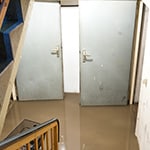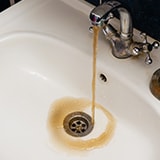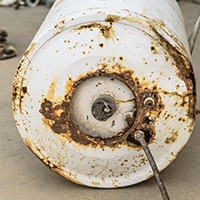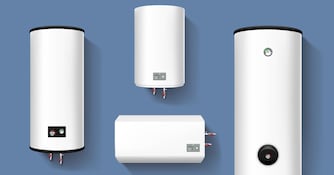
How Do You Know When to Replace a Hot Water Heater?
 You’ve heard the stories. A 60-gallon hot water heater tank ruptures, flooding someone’s basement with smelly, rusty water. Now, not only are they stuck with cold showers, but they're ankle-deep in water.
You’ve heard the stories. A 60-gallon hot water heater tank ruptures, flooding someone’s basement with smelly, rusty water. Now, not only are they stuck with cold showers, but they're ankle-deep in water.
Knowing when to replace a water heater is critical to avoid this nightmare scenario. You should replace your water heater before it fails to prevent flooding and a lack of hot water. Although it can fail at any time, there are distinct warning signs that your hot water heater is going out.
How Long Do Water Heaters Last?
The typical tank water heater lasts 10-12 years, although it can sometimes last longer or shorter depending on how well it’s maintained and the local water quality.
Your water heater’s age is a great place to start when deciding whether it needs to be replaced. If it’s less than ten years old, chances are it’s fine. If your water heater is more than ten years old, you should take a closer look for signs of trouble.
Signs You Need a New Water Heater
The following symptoms can help you decide when to replace a water heater.
The Temperature is Inconsistent
 Most home hot water tanks aim to keep internal fluid temperature somewhere between 110 and 120 degrees Fahrenheit, an ideal temperature range for a broad range of applications from showers to washing dishes.
Most home hot water tanks aim to keep internal fluid temperature somewhere between 110 and 120 degrees Fahrenheit, an ideal temperature range for a broad range of applications from showers to washing dishes.
If your water heater is unable to maintain this water temperature consistently, check what your water heater's thermostat is set to. If it’s set correctly (somewhere within the ideal temperature range) and still provides water at an inconsistent temperature, it could be a sign of a worn or broken heating element.
One key point to remain aware of is that too high OR too low a water temperature are both indications of heating element failure, so don't just compensate for a higher-than-normal water temperature by adjusting the thermostat lower than it should be!
Abnormal Noises
 If an aging water heater is producing loud creaking or knocking sounds, it can be a sign of internal corrosion. When mineral deposits come into contact with the water heater's heating element, they burn away, which creates sound.
If an aging water heater is producing loud creaking or knocking sounds, it can be a sign of internal corrosion. When mineral deposits come into contact with the water heater's heating element, they burn away, which creates sound.
If you hear noises, hire a contractor to flush the tank for you, and check your internal tank lining or sacrificial anode rod for damage. Damage to the internal tank lining is a good sign that it's time to replace your water heater.
Rust in Water
 If your hot water is brown, that’s a problem. Although there are various causes (like a corroded pipe), rusty water could be an indication that your water heater is going out.
If your hot water is brown, that’s a problem. Although there are various causes (like a corroded pipe), rusty water could be an indication that your water heater is going out.
Over time, mineral deposits and rust collect in your hot water tank. These deposits come from the water, which is why areas that have water with more minerals (harder water) are more likely to take a toll on your water heater.
After a certain point, the buildup can become so great that it contaminates your water. It can also block the pressure relief valve and eventually eat through the tank and form rust on the outside. If you see rust anywhere on your tank, it’s only a matter of time before it springs a leak.
Leaks
 The most obvious warning sign that your hot water heater is going out is a leak. If there’s a puddle forming around your water heater due to a leak, replace it immediately. Don’t wait for the trickle to become a deluge.
The most obvious warning sign that your hot water heater is going out is a leak. If there’s a puddle forming around your water heater due to a leak, replace it immediately. Don’t wait for the trickle to become a deluge.
Keep in mind that the leak can be extremely tiny at first, but it won’t stay that way for long. One trick to detect a future leak is to feel the tank with your palm for any bulging. Bulging can be a sign that rust is starting to eat through the tank.
How to Avoid These Problems
As mentioned, properly maintaining your water heater by flushing it of mineral deposits every year can go a long way to preventing premature failure. Since mineral deposits are the primary cause of water heater failures, reducing them can be a game-changer.
You can also consider buying a tankless water heater. These units have no tank, so, even when they fail, you won’t have anywhere near the mess.
Overall, checking for the above signs will help you avoid a nightmare scenario because you'll know to replace the water heater before it's too late.





